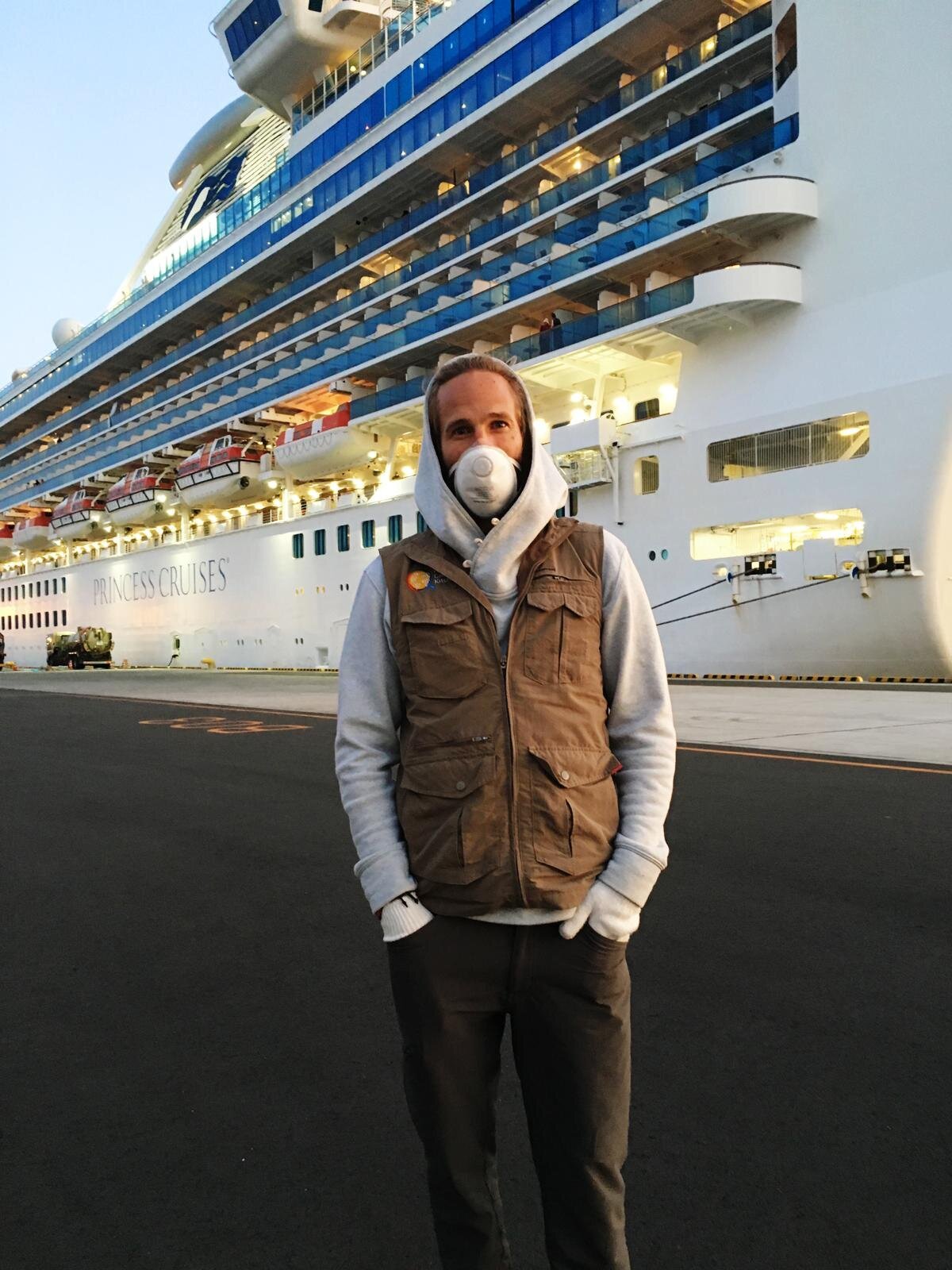FORGET CLIMATE CHANGE, MAKE WAY FOR CORONOIA
Sebastian pictured in front of the Diamond Princess, a cruise ship quarantined in Japan’s Port of Yokohama.
Activism and protesting for climate change is nothing new; rallies inspired by global climate activists and organisations have galvanised millions of people into action. Whether it is on Instagram, Facebook, or Twitter, the effects of these rallies have reached millions more.
Since the fairly recent COVID-19 (Coronavirus) outbreak, a flurry of fear and paranoia has swept up the general population in what is being referred to as ‘Coronoia’, which is pushing activists to ask the question, why aren’t we treating the climate crisis with the same urgency as the COVID-19 crisis?
When we look at COVID-19 side-by-side with the effects of climate change there is, statistically, no comparing the two. As an example, the virus has resulted in the deaths of more than 16,000 people* since December 2019, while the World Health Organisation has estimated that 7 million people die from air pollution related deaths each year.
As Coronoia rages on, empty supermarket shelves are becoming the norm all over the world.
COVID-19 vs CLIMATE CHANGE RESPONSES
There have been significant differences in the handling of a global outbreak in comparison to climate change action. For some reason, world leaders and global companies treat a climate crisis as tomorrow’s problem; something several decades down the line. Unfortunately, this definitely isn’t the case. We already know that we have just under 10 years to prevent a rise in pre-industrial temperature by 1.5°C to decrease the risks of extreme drought, heat, poverty, and floods; and not to mention that the ice in the Antarctic is melting more than four times faster that it was 40 years ago. We’re living in turbulent times.
The world’s response to these scientific findings? Well, despite repeated condemnation from climate activists and organisations, the best we’ve been able to come up with are measly promises to use cleaner technologies in a bid to reduce carbon emissions. Effectively, the majority of the changes have been intangible. But, when it comes to COVID-19, the reaction’s been quite the complete opposite. Major cities have placed millions of people under quarantine, politicians have spoken publicly to the media about what they’ll be doing to help combat the virus, and scientists are racing to create a vaccine to protect as many people as possible.
But where is the same urgency when it comes to the climate? We have known about an impending environmental crisis for 30 to 40 years and have had plenty of time to put changes in place in order prevent unnecessary climate-related deaths.
As Coronoia rages on, empty supermarket shelves are becoming the norm all over the world.
COVID-19 vs CLIMATE CHANGE RESPONSES
There have been significant differences in the handling of a global outbreak in comparison to climate change action. For some reason, world leaders and global companies treat a climate crisis as tomorrow’s problem; something several decades down the line. Unfortunately, this definitely isn’t the case. We already know that we have just under 10 years to prevent a rise in pre-industrial temperature by 1.5°C to decrease the risks of extreme drought, heat, poverty, and floods; and not to mention that the ice in the Antarctic is melting more than four times faster that it was 40 years ago. We’re living in turbulent times.
The world’s response to these scientific findings? Well, despite repeated condemnation from climate activists and organisations, the best we’ve been able to come up with are measly promises to use cleaner technologies in a bid to reduce carbon emissions. Effectively, the majority of the changes have been intangible. But, when it comes to COVID-19, the reaction’s been quite the complete opposite. Major cities have placed millions of people under quarantine, politicians have spoken publicly to the media about what they’ll be doing to help combat the virus, and scientists are racing to create a vaccine to protect as many people as possible.
But where is the same urgency when it comes to the climate? We have known about an impending environmental crisis for 30 to 40 years and have had plenty of time to put changes in place in order prevent unnecessary climate-related deaths.




